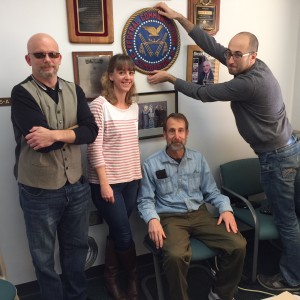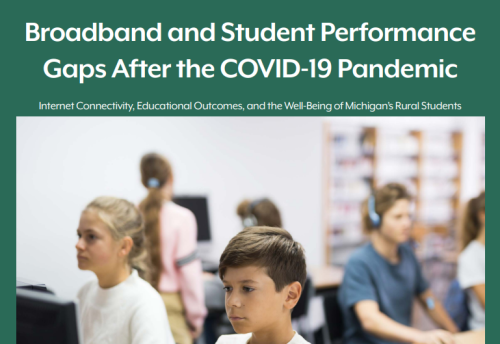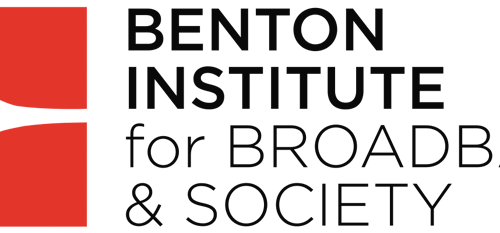Dear Colleagues and Friends of the Quello Center:
Since my last up-date, our Postdoctoral Researcher, Bianca C. Reisdorf, and Assistant Research Professor, Aleksandr Yankelevich, have come onboard. In collaboration with our Research Associates and Assistants, they have enabled us to move forward on new research proposals with some early success.
Developing Research Foci: Digital Inequalities and Net Neutrality
The mission of the James and Mary Quello Center is to conduct high-quality research that will stimulate and inform debate on media, communication, and information policy for our digital age. A wide range of policy issues have been identified for study, but two general areas have emerged from our early work, which focus on:
Network Neutrality
Our plan to develop a natural experiment to assess the impact of net neutrality rulings has drawn a number of faculty together across the campus in shaping some preliminary research, and proposals which we hope to submit in the coming months.
Digital Inequalities
Two proposals have been accepted, and several others are submitted or underway to study digital divides and inequalities in Detroit, Michigan, and across the United States.
Researching Locally to Speak Globally
The Quello Center is moving ahead in focusing greater attention on new Internet and digital age policy issues with an even more multi-disciplinary set of researchers and strong additions to our remarkable Advisory Board. We address issues that arise from: problems such as risks to privacy and freedom of expression; innovations such as around the Internet of Things and wearables; policies such as net neutrality, price cap regulation of access services, and universal broadband; and contexts, such as issues in cities like Detroit, and in households. To do so, we draw from theoretical perspectives, such as the Fifth Estate, sociological and communication perspectives on information inequalities, work on the ecology of games as well as game theoretical economics; and from innovative empirical approaches, such as a novel design for a national broadband availability dataset.
Over this last year, the Center has found a number of local developments that present clear opportunities to pursue issues that are of nationwide and global concern. This has led us to anchor more of our research locally, such as in looking at digital divides in Michigan and Detroit, and in developing ideas for new research on the use of wireless spectrum for last mile access, and for experiments addressing digital inequalities and the future of public broadcasting. In these areas, we plan to work with the local public broadcasting station, WKAR, and faculty across the university. Together, we can realize the opportunities created by MSU choosing to forgo the FCC’s incentive auction of spectrum in favor of turning the station and its spectrum into an even greater resources for research, teaching, and service, such as through an MSU partnership announced with Detroit public broadcasting to create more educational programming.
Quello Center Seminars and Lectures at MSU, in Washington DC & Worldwide
The Center organizes and promotes an active stream of roundtables, seminars, and lectures to stimulate discussion of policy and regulatory issues. Recent lectures and events have focused on Internet policy and regulation, network neutrality, social media and reputation management, digital inequalities, and social accountability. In addition to holding events at the Center and in Washington DC, we have been speaking at a variety of other universities, conferences, and events organized by others. For example, Quello helps support the Telecommunication Policy Research Conference (TPRC), and the director has spoken recently in Canada, Argentina, Denmark, South Africa, Hong Kong, China, Japan, and Mexico.
A list of past and forthcoming events are available at: http://quello.msu.edu/events/ and videos of many of our events are available on Vimeo at: https://vimeo.com/quellocenter.
Selected Working Papers on Research, Policy and Practice
All of our research reports, working papers, and publications are listed on our Web site at: http://quello.msu.edu/publications/. A set of papers that illustrate the range of our work includes:
Bauer, J. M. and Dutton, W. H. (2015), ‘The New Cyber Security Agenda,’ for the World Bank Development Report. Available at SSRN: http://ssrn.com/abstract=2614545 or http://dx.doi.org/10.2139/ssrn.2614545
Dutton, W.H. and Graham, M. (2014), Society and the Internet (Oxford University Press).
Dutton, W. H. (2015), ‘Multistakeholder Governance?,’ for the World Bank Development Report. Available at SSRN: http://ssrn.com/abstract=2615596 or http://dx.doi.org/10.2139/ssrn.2615596
Reisdorf, B. C., & Groselj, D. (2015). ‘Internet (non-) Use Types and Motivational Access: Implications for Digital Inequalities Research,’ New Media & Society, Online First.
Reisdorf, B. C., & Jewkes, Y. (2016). ‘(B)Locked Sites: Cases of Internet Use in Three British Prisons,’ Information, Communication & Society, 1-16.
UNESCO (2015), Keystones to Foster Inclusive Knowledge Societies. Paris: UNESCO.
The English version is available at: http://unesdoc.unesco.org/images/0023/002325/232563E.pdf.
Yankelevich, A., & Vaughan, B. `Price-Match Announcements in a Consumer Search Duopoly.’ Forthcoming at Southern Economic Journal.
Access to the Work of the Quello Center
Over the past year, we have also made strides to providing numerous ways to keep in touch with the Quello Center’s work. In addition to this newsletter, we have a:
• Quello Center Blog
• Quello Facebook Page
• Twitter handle @QuelloCenter
• Working Paper Series on SSRN
• Videos of most of many of our lectures and seminars on Vimeo
Thank you again, and please keep in touch. Follow the work and ideas of the Quello Center on Twitter or Facebook, and write to the Center at Quello@msu.edu if you have any questions, suggestions, or wish to be added to our email list.
Sincerely,
Bill
William Dutton, Director
Quello Professor of Media and Information Policy




